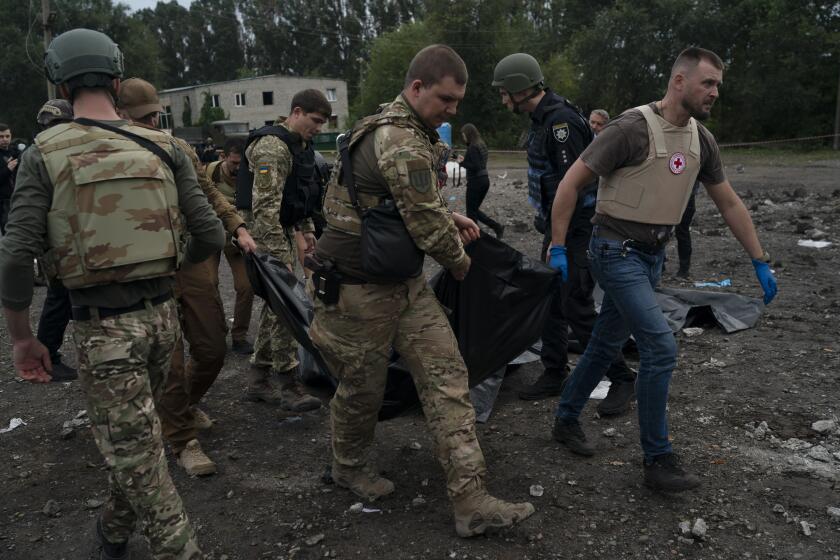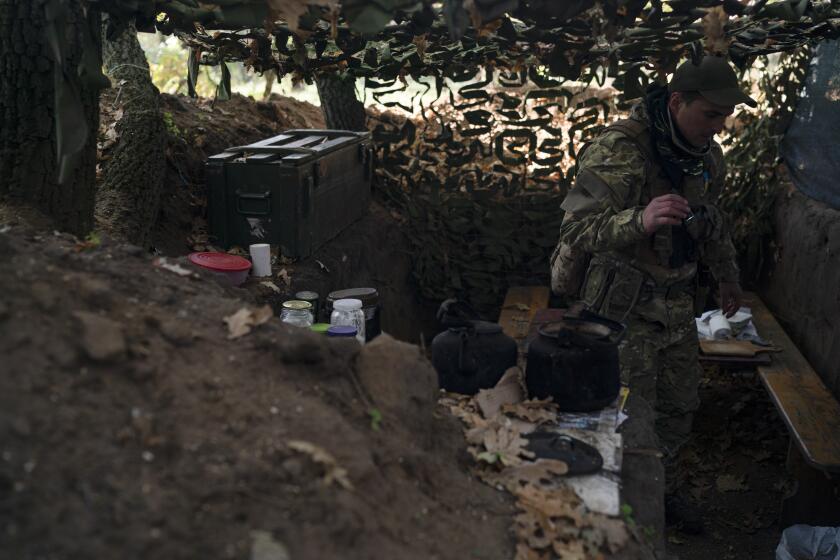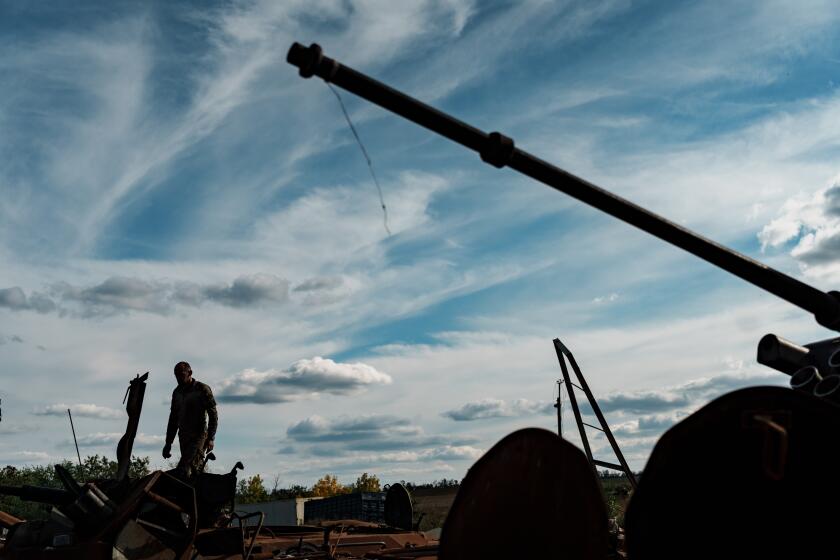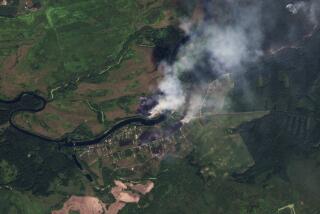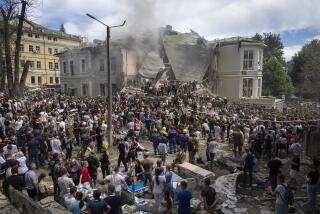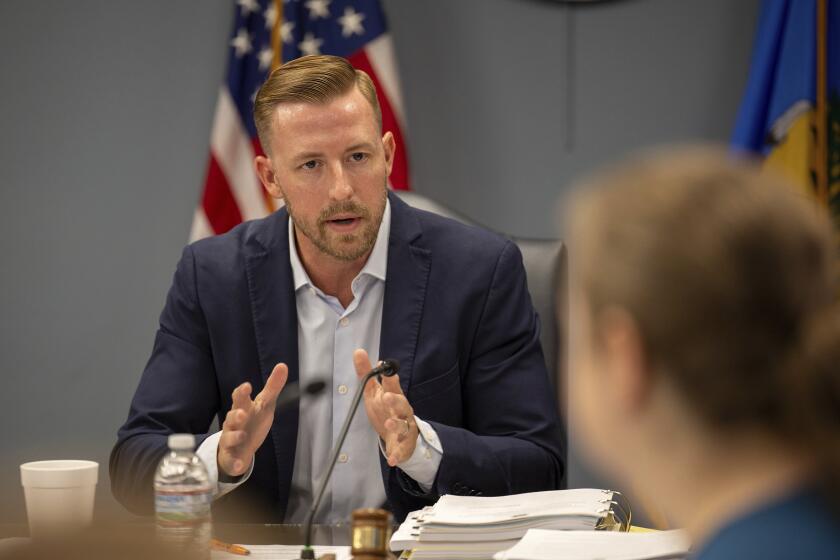Ukraine blamed for rocket attack that struck mayor’s office in separatist-controlled city
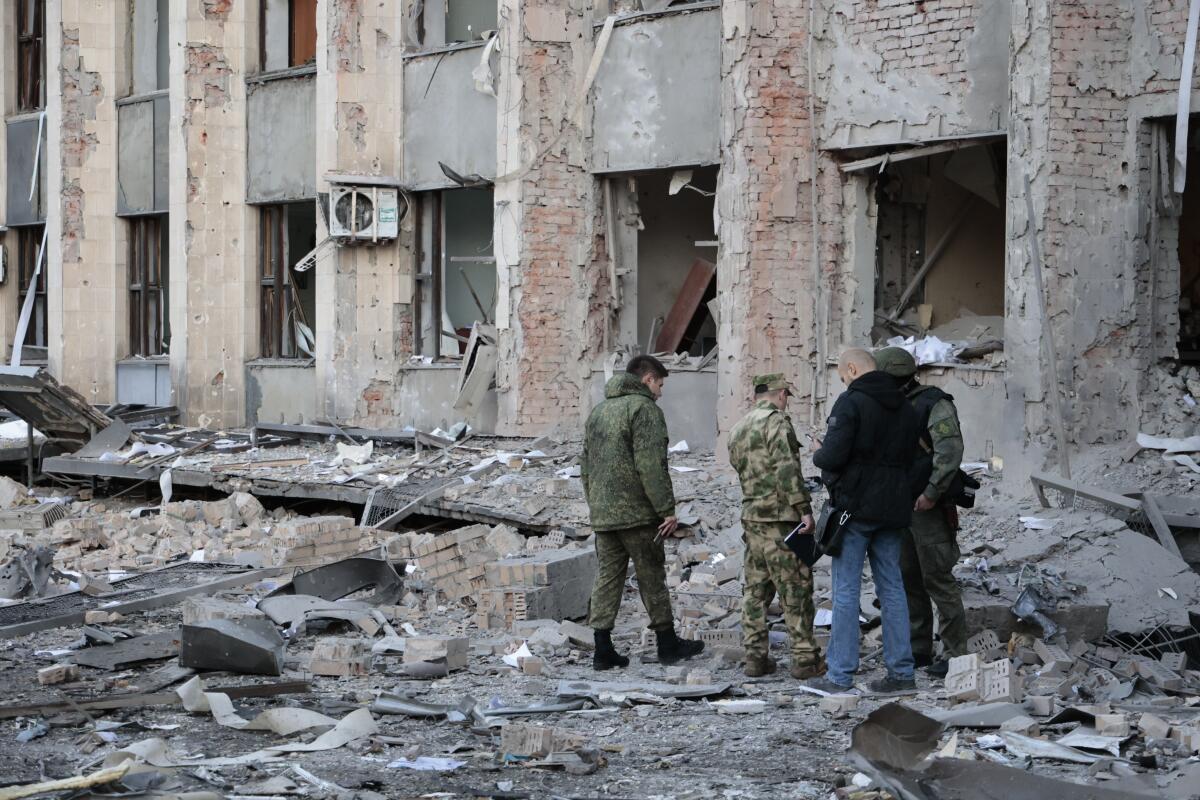
KYIV, Ukraine — Pro-Kremlin officials on Sunday blamed Ukraine for a rocket attack that struck the mayor’s office in a key Ukrainian city controlled by the separatists. Separately, Ukrainian officials said Russian rockets struck a city across from the Zaporizhzhia nuclear power plant, injuring six people.
The attacks on both sides came as Russia has lost ground in the nearly seven weeks since Ukraine’s armed forces opened their southern counteroffensive. Last week, in retaliation, the Kremlin launched what is believed to be its largest coordinated air and missile raids on Ukraine’s key infrastructure since Russia’s invasion of Ukraine on Feb. 24.
The municipal building in separatist-controlled Donetsk was seriously damaged by the rocket attack. Plumes of smoke swirled around the building, which had rows of blown-out windows and a partially collapsed ceiling. Cars nearby were burned out.
There were no immediate reports of casualties. Kyiv didn’t immediately claim responsibility or comment on the attack.
Kremlin-backed separatist authorities have previously accused Ukraine of numerous strikes on infrastructure and residential targets in the occupied regions, often employing the U.S.-supplied long-range HIMARS rockets, without providing corroborating information.
Separately, Ukrainian authorities Sunday reported that at least six people were wounded as a result of rocket attacks across from Zaporizhzhia, Europe’s largest nuclear power plant, where Russia has stationed its troops.
Ukrainian forces have recently recaptured swaths of territory in northeast, east and south, sending Russian troops fleeing. But in ravaged towns, suffering doesn’t stop with occupation’s end.
Kyrylo Tymoshenko, deputy head of the Ukrainian president’s office, said that two residents of Nikopol had been hospitalized following the strikes, which also damaged five power lines, gas pipelines, and a raft of civilian businesses and residential buildings.
Russia and Ukraine have repeatedly accused each other of firing at and around the plant, which continues to be run by its pre-occupation Ukrainian staff. Ukrainian officials have also regularly reported on attacks on civilian communities across the Dnieper River from the plant, including in Nikopol and nearby Marhanets.
The presidential office and regional authorities also reported that Russian rockets destroyed two schools, a park and private houses in the southern region of Zaporizhzhia, which has seen sustained Russian shelling since Moscow illegally annexed it along with three other Ukrainian provinces last month.
The annexation announcement came despite the fact that some 20% of Zaporizhzhia remains under Ukrainian military control, with some analysts painting the recent large-scale strikes as part of the Kremlin’s strategy to subdue the region.
The presidential office also said that Moscow continued to shell civilian settlements along the front line in the eastern Kharkiv and Luhansk regions, where Kyiv has been pressing a counteroffensive. It added that “active hostilities” continued in the southern Kherson region, another key focus of the ongoing Ukrainian advance, with repeated Russian strikes on a series of villages recently retaken by Kyiv.
Russian officials, meanwhile, said their air defenses in the southern Belgorod region bordering Ukraine shot down “a minimum” of 16 Ukrainian missiles, Ria Novosti reported. The regional governor, Vyacheslav Gladkov, also wrote on Telegram that three members of the same family were wounded as a result of shelling.
Russian authorities in border regions have repeatedly accused Kyiv of firing at their territory, and claimed that civilians were being wounded in the attacks. Ukraine has not claimed responsibility for or commented on the alleged attacks.
Russia’s mobilization of army reservists has proved unpopular, with hundreds of thousands of men leaving the country to avoid the draft.
On Saturday two men from a former Soviet republic who were training at a Russian military firing range in Belgorod fired at volunteer soldiers during target practice, killing 11 and wounding 15 before being slain themselves. The Russian Defense Ministry, which reported the killings, called the incident a terrorist attack.
This week’s wide-ranging retaliatory attacks by Russia, which included the use of self-destructing explosive drones from Iran, killed dozens of people.
On Sunday, the French government confirmed it is pledging air defense missiles to protect Ukrainian cities against drone strikes and stepped-up training for Ukrainian soldiers as it seeks to puncture perceptions that France has lagged in supporting Ukraine.
Up to 2,000 Ukrainian soldiers will be embedded with military units in France, rotating through for several weeks of combat training, more specialized training in logistics and other needs, and training on equipment being supplied by France, the French defense minister, Sébastien Lecornu, said in an interview published Sunday in Le Parisien.
Russian President Vladimir Putin said Friday that Moscow didn’t see a need for additional widespread strikes but that his military would continue selective ones. He said that of 29 targets the Russian military planned to knock out in this week’s attacks, seven weren’t damaged and would be taken out gradually.
The Institute for the Study of War, a think tank based in Washington, interpreted Putin’s remarks as intended to counter criticism from pro-war Russian bloggers who “largely praised the resumption of strikes against Ukrainian cities, but warned that a short campaign would be ineffective.”
Rights groups say Moscow’s practice of transporting captured Ukrainian civilians to Russia is illegal under international law. Hundreds, perhaps thousands, have vanished from Russian-occupied areas.
The institute, in an online update late Saturday, accused Moscow of conducting “massive, forced deportations of Ukrainians,” which it said likely amount to ethnic cleansing.
The update referenced statements made this week by Russian authorities, which claimed that “several thousand” children from a southern region occupied by Moscow had been placed in rest homes and children’s camps in Russia amid an ongoing Ukrainian counteroffensive. The original remarks by Russia’s deputy prime minister, Marat Khusnullin, were reported by RIA Novosti agency Friday.
Russian authorities have previously openly admitted to placing children from Russian-held areas of Ukraine, who they said were orphans, for adoption with Russian families, in a potential breach of a key international treaty on genocide prevention.
Elsewhere, the Ukrainian military Sunday morning accused pro-Kremlin fighters of evicting civilians in occupied territories in order to accommodate officers in their homes, an act it also described as a violation of international humanitarian law.
The General Staff of the Armed Forces of Ukraine said in its regular Facebook update that the evictions were happening in the Russian-held city of Rubizhne, in the eastern Luhansk region where Kyiv has been pressing a counteroffensive. It did not provide corroborating evidence for its claim.
More to Read
Sign up for Essential California
The most important California stories and recommendations in your inbox every morning.
You may occasionally receive promotional content from the Los Angeles Times.
